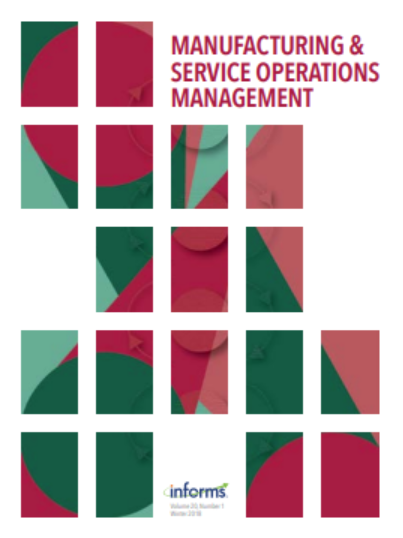移动支付服务、政府参与与移动网络运营商绩效
IF 4.8
3区 管理学
Q1 MANAGEMENT
M&som-Manufacturing & Service Operations Management
Pub Date : 2022-01-07
DOI:10.1287/msom.2021.1068
引用次数: 1
摘要
问题定义:移动支付服务(MPS)的最新发展表明,移动政府(m-government)举措在改善移动网络运营商(MNO)的市场表现和金融包容性方面发挥着越来越大的作用。高昂的成本和运营挑战阻碍了MNO全面致力于MPS的开发,但移动政府下的政府参与可能会通过提供激励MNO所需的规模和范围来增加MNO的用户基础。学术/实践相关性:对移动支付的现有研究忽视了政府作为移动金融生态系统中重要利益相关者的作用。我们的研究通过考察政府作为商业伙伴在MPS发布中的作用以及政府参与对MNO用户群的影响,为文献做出了贡献。方法:使用来自移动网络行业的独特专有数据集,我们设计了一个准实验来检验政府参与MPS对MNO总移动连接的因果影响。更重要的是,我们采用了变化中的变化(CIC)估计方法,进一步建立了基于MNO规模和MPS类型的政府参与的非线性处理效果。结果:我们发现,政府的参与扩大了MNO用户群,超出了MPS的发布范围。这种影响随着MNO的规模和MPS的多样性而增加,有利于更大的MNO,在一定程度上,也有利于政府参与的MPS提供多样化服务的MNO。政府参与MPS的启动也直接使MNO受益于小额贷款服务。此外,鼓励金融包容性的政府法规和政策也可以扩大MNO的用户基础。管理影响:政府作为监管机构和商业伙伴,在促进技术和金融服务方面发挥着关键作用。为改善市场表现,跨国公司应利用政府服务的规模和范围,与政府机构合作推出MPS。MNO还应接受政府政策和法规,以增加用户基础。本文章由计算机程序翻译,如有差异,请以英文原文为准。
Mobile Payment Services, Government Involvement, and Mobile Network Operator Performance
Problem definition: Recent developments in mobile payment services (MPS) have shown an increasing role of mobile-government (m-government) initiatives in improving the market performance of mobile network operators (MNOs) and financial inclusion. High costs and operational challenges have discouraged MNOs from fully committing to the development of MPS, but government involvement under m-government may increase MNO user bases by providing the scale and scope necessary to incentivize MNOs. Academic/practical relevance: Extant research on mobile payment has ignored the role of governments as important stakeholders in the mobile financial ecosystem. Our research contributes to the literature by examining the role of governments as business partners in MPS launches and the effect of government involvement on MNO user bases. Methodology: Using a unique proprietary data set from the mobile network industry, we design a quasi-experiment to examine the causal effects of government involvement in MPS on MNOs’ total mobile connections. More importantly, we adopt a changes-in-changes (CIC) estimation approach to further establish nonlinear treatment effects of government involvement based on MNO size and MPS type. Results: We find that government involvement expands MNO user bases beyond MPS launches. Such effects increase with MNO size and MPS variety, favoring larger MNOs and, to a certain degree, MNOs with diverse offerings of government-involved MPS. Government involvement in MPS launches also directly benefits MNOs with microloan services. In addition, government regulations and policies to encourage financial inclusion can also expand MNO user bases. Managerial implications: Governments play a critical role in promoting technologies and financial services both as a regulator and as a business partner. To improve market performance, MNOs should take advantage of the scale and scope of government services by partnering with government agencies in launching MPS. MNOs should also embrace government policies and regulations to increase user bases.
求助全文
通过发布文献求助,成功后即可免费获取论文全文。
去求助
来源期刊

M&som-Manufacturing & Service Operations Management
管理科学-运筹学与管理科学
CiteScore
9.30
自引率
12.70%
发文量
184
审稿时长
12 months
期刊介绍:
M&SOM is the INFORMS journal for operations management. The purpose of the journal is to publish high-impact manuscripts that report relevant research on important problems in operations management (OM). The field of OM is the study of the innovative or traditional processes for the design, procurement, production, delivery, and recovery of goods and services. OM research entails the control, planning, design, and improvement of these processes. This research can be prescriptive, descriptive, or predictive; however, the intent of the research is ultimately to develop some form of enduring knowledge that can lead to more efficient or effective processes for the creation and delivery of goods and services.
M&SOM encourages a variety of methodological approaches to OM research; papers may be theoretical or empirical, analytical or computational, and may be based on a range of established research disciplines. M&SOM encourages contributions in OM across the full spectrum of decision making: strategic, tactical, and operational. Furthermore, the journal supports research that examines pertinent issues at the interfaces between OM and other functional areas.
 求助内容:
求助内容: 应助结果提醒方式:
应助结果提醒方式:


